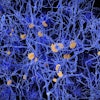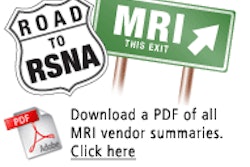Siemens Medical Solutions has added another 3-tesla MRI system to its MR product line, a unit that also features the company's ultrawide magnet opening to aid in patient positioning and comfort.
Erlangen, Germany-based Siemens debuted Magnetom Verio on October 31, and will introduce it to its U.S. customer base through a series of road shows. Cleared by the U.S. Food and Drug Administration earlier in the month, the system has a magnet bore opening of 70 cm in diameter, and also includes the company's Total imaging matrix (Tim) surface-coil concept, designed to speed up exam workflow by covering patients with surface coils, eliminating the need to have coils swapped in and out during the scan.
"The impetus to develop Verio was in response to the marketplace," said Jeffrey Bundy, vice president of Siemen's MRI division. "We had specific requests for a 3-tesla unit with a 70-cm bore, and the feedback was that this combination would be very effective."
Magnetom Verio's wider opening can allow for reduced sedation, as patients aren't as claustrophobic, Bundy said, and it also allows patients to be positioned on their side rather than on their back, if needed. It is based on Siemens's syngo software platform and also features 32 independent radiofrequency channels and up to 102 integrated coil elements.
Interest in 3-tesla MRI has heated up in the past few years. The technology's increased noise-to-signal ratio improves MR angiography images, and speeds such applications as functional MRI and spectroscopy. Shorter scan times can improve patient throughput; some users say that brain imaging results in particular are superior on a 3-tesla unit as compared to a 1.5-tesla system. Spatial resolution is markedly less: a head scan with 1-tesla MRI produces slices of 7 mm, while the same scan with a 3-tesla unit produces slices between 3- and 4-mm thick.
And interest in wider magnet bores has also increased, particularly for scanning obese patients.
But with the advent of the Deficit Reduction Act (DRA) of 2005 -- and facilities' ensuing caution around capital purchases -- will a 3-tesla MR system with a 70-cm bore take off? You bet, according to Bundy.
"The DRA went into effect at the beginning of this year, and a lot of our customers wanted to take a look and see exactly what the impact would be," he said. "We're still in that period, where facilities are evaluating the post-DRA landscape, but we're also seeing interest in capital purchases building again. MR procedure volume is continuing to grow, and as more and more customers focus on workflow, ease of use, and throughput concerns, they're increasingly interested in systems that will make their department more efficient."
Throughout the development of Magnetom Verio, Siemens worked to keep its own costs down in an effort to pass that savings on to its customers, Bundy said. The company has also worked to address the concern that 3-tesla MRI is too complicated to use for regular clinical applications.
"The software that runs Verio is the same as the software that runs our 1.5-tesla units," he said. "The applications are the same, and the tools clinicians use (on Verio) are the same. To help customers get used to differences between 3-tesla and 1.5-tesla MRI, we offer training from our applications specialists."
Siemens plans its first U.S. install of Magnetom Verio at the end of this year, at Johns Hopkins Bayview Medical Center in Baltimore. The company has orders for two that will be installed the first part of calendar year 2008, and it expects to be regularly delivering the unit by the middle of next year.
"What we're most excited about is combining Tim technology with two of the biggest trends in MR together in one system: 3-tesla MR with a 70-cm bore," Bundy said.
By Kate Madden Yee
AuntMinnie.com staff writer
October 31, 2007
Related Reading
Road to RSNA, Siemens Medical Solutions, October 29, 2007
Road to RSNA, Siemens Medical Solutions, October 26, 2007
Siemens gets European OK for Dade Behring buy, October 25, 2007
Road to RSNA, Siemens Medical Solutions, October 25, 2007
Road to RSNA, Siemens Medical Solutions, October 24, 2007
Copyright © 2007 AuntMinnie.com



.fFmgij6Hin.png?auto=compress%2Cformat&fit=crop&h=100&q=70&w=100)





.fFmgij6Hin.png?auto=compress%2Cformat&fit=crop&h=167&q=70&w=250)











